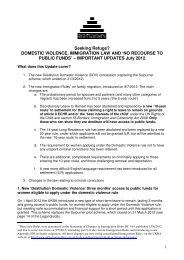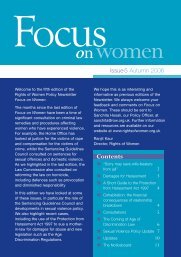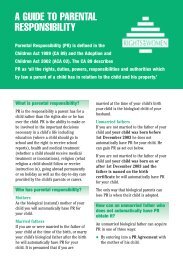Seeking Refuge? - Rights of Women
Seeking Refuge? - Rights of Women
Seeking Refuge? - Rights of Women
You also want an ePaper? Increase the reach of your titles
YUMPU automatically turns print PDFs into web optimized ePapers that Google loves.
For information about how claims are decided see<br />
Chapters 3, 4, 5 and 6. For information about the<br />
different types <strong>of</strong> leave to remain in the UK see<br />
Chapter 7. For information about appealing<br />
against a negative decision see Chapter 8.<br />
Who decides my case?<br />
A claim for asylum or some other form <strong>of</strong><br />
protection in the UK is decided initially by a<br />
case-owner in the UK Border Agency.<br />
The UK Border Agency 1 is the part <strong>of</strong> the Home<br />
Office that deals with asylum, immigration and<br />
nationality issues. The Home Office is a<br />
department in the UK Government.<br />
A case-owner is someone in the UK Border<br />
Agency who interviews people who have applied<br />
for asylum and makes the initial decision on<br />
whether or not they should be given permission<br />
to remain in the UK.<br />
If your initial application for protection to the UK<br />
Border Agency is refused, you can appeal against<br />
it to the Asylum and Immigration Tribunal. If<br />
you do appeal, then the decision on your appeal is<br />
taken by an Immigration Judge who is<br />
independent <strong>of</strong> the UK Border Agency.<br />
In order to decide whether or not you should be<br />
given protection in the UK, and what type <strong>of</strong><br />
protection you should be given, the person who<br />
makes the decision (the case-owner at the UK<br />
Border Agency or the Immigration Judge at the<br />
Asylum and Immigration Tribunal) must consider<br />
all the relevant international and domestic law.<br />
“<br />
A decision-maker is the person<br />
who makes a decision in your<br />
case. The decision-maker could<br />
be either a case-owner at the<br />
UK Border Agency or an<br />
immigration judge at the<br />
Asylum and Immigration<br />
Tribunal.<br />
”<br />
The <strong>Refuge</strong>e Convention<br />
The UK follows the law set out in the 1951 UN<br />
Convention Relating to the Status <strong>of</strong><br />
<strong>Refuge</strong>es and its 1967 Protocol, usually called<br />
the <strong>Refuge</strong>e Convention. The <strong>Refuge</strong>e Convention<br />
is international law that tries to protect people<br />
who flee persecution in their country.<br />
A person who is granted protection under the<br />
<strong>Refuge</strong>e Convention will be given <strong>Refuge</strong>e<br />
Leave for 5 years.<br />
Article 1A <strong>of</strong> the <strong>Refuge</strong>e Convention states that<br />
a refugee is someone who:<br />
• has a well-founded fear <strong>of</strong> being persecuted<br />
for one <strong>of</strong> the following convention reasons:<br />
AND<br />
“<br />
“<br />
o race<br />
o religion<br />
o nationality<br />
o political opinion<br />
o membership <strong>of</strong> a “particular social group”<br />
• is outside her home country;<br />
AND<br />
• her State is either unwilling or unable to<br />
protect her from the persecution.<br />
A country is the geographical<br />
area that a person lives in, such<br />
as England or Wales.<br />
”<br />
A State is the government <strong>of</strong> a<br />
country. The word ‘State’ refers<br />
to the <strong>of</strong>ficial institutions<br />
responsible for controlling a<br />
country, such as local and<br />
national government, the<br />
police and the army.<br />
What is persecution?<br />
”<br />
Persecution is a form <strong>of</strong> serious harm, such as the<br />
abuse <strong>of</strong> a fundamental human right. A<br />
fundamental human right is one <strong>of</strong> the rights that<br />
are most important, such as the right to life and<br />
the right to be free from torture.<br />
1 It used to be called the Border and Immigration Agency (the BIA) and before that the Immigration and Nationality Directorate<br />
(the IND).<br />
11
















